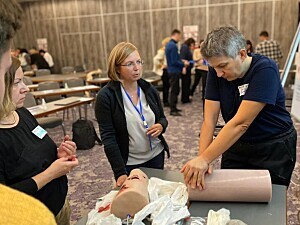Brigham and Women’s Hospital colorectal cancer surgeon Nelya Melnitchouk, MD, MSc, was born and raised in Ukraine, and all of her in-laws still live there. Understandably, Russia’s invasion of the country has hit her particularly hard.
Soon after hostilities began in February 2022, Dr. Melnitchouk and her husband, Serguei Melnitchouk, MD, MPH, a fellow Ukrainian and a cardiac surgeon at Massachusetts General Hospital, were brainstorming ideas for helping the people of their native country. They landed on creating Ukrainian-language videos and other content to teach Ukrainian civilians and physicians how to treat trauma wounds.
Dr. Melnitchouk subsequently teamed with Eric Goralnick, MD, MS, an emergency medicine physician at the Brigham, on a Stop the Bleed video that shows laypeople how to care for an individual with a traumatic injury. The video includes instructions in Ukrainian on how to apply pressure, pack a wound, apply a tourniquet, and other techniques to reduce preventable deaths.
In 2016, the American College of Surgeons introduced its first Stop the Bleed training courses. According to the organization, over 1 million laypeople have since completed the training. With their video, Drs. Melnitchouk and Goralnick are bringing these lessons to Ukrainian civilians.
“I called Dr. Goralnick because he was already teaching and promoting Stop the Bleed in the United States, and we filmed the video together in the Brigham simulation center,” Dr. Melnitchouk says. “There is evidence behind the training. We know that it helps people who are not medically trained to stop bleeding and potentially save lives.”
Creating Educational Content for Ukrainian Physicians and Civilians
Dr. Melnitchouk’s involvement in Ukrainian health care predates the war. A longstanding focus of her academic work has been enhancing colorectal cancer care in the country.
“I came to realize that English-language proficiency and having access to high-quality, evidence-based education materials was an issue in Ukraine,” she says. “So, patients were not being treated with the most recent evidence that we have.”
In 2017, the Melnitchouks co-founded the nonprofit Global Medical Knowledge Alliance (GMKA) to improve cancer care in Ukraine and globally. GMKA creates evidence-based, expert-written educational content for physicians and civilians that is available via an online educational platform. Since the onset of the war, GMKA has expanded its mission to encompass trauma care as well.
In addition to the Stop the Bleed video, Dr. Melnitchouk has led efforts to prepare Ukraine’s physicians to deal with the rising number of trauma cases.
“As a cancer surgeon myself, I’ve tried to put myself in the shoes of any physician who is not familiar with treating trauma injuries or war injuries,” she says. “In that setting, someone like me could be called upon to do that work, so I tried to figure out what resources they were lacking.”
GMKA thus set out to translate Advanced Trauma Life Support (ATLS), the world’s gold standard for managing trauma, into Ukrainian for the country’s physicians. The organization has also translated ATLS videos and is now producing videos on various surgical procedures. Furthermore, GMKA has released eight videos for physicians and civilians on responding to chemical, biological, radiological, and nuclear attacks.
Navigating Cancer Care During Wartime
Cancer care in Ukraine remains an urgent concern for Dr. Melnitchouk. GMKA regularly posts original, evidence-based articles and videos on treating specific types of cancer. All content is available in both English and Ukrainian.
Dr. Melnitchouk is also part of a National Cancer Institute of Ukraine committee that crafted guidelines for cancer care during wartime. Initially, she thought her experience managing patients during the early days of the COVID-19 pandemic would offer useful insights into what care should be prioritized and what care could wait.
“However, the issues during a war are much more complicated than during a pandemic,” she says. “Clinicians have to think about safety, obviously, but it’s also difficult to prioritize what kinds of cases they can do. For example, due to damage to the electrical infrastructure, many hospitals are relying on generators. That can prevent patients from getting CT scans, MRIs, or radiation treatment. So, there’s a lot of unpredictability and interruptions in care.”
While seeing Ukraine at war has been distressing, Dr. Melnitchouk takes heart in being able to help in some small way. “We get a good amount of positive feedback from trauma surgeons, regular surgeons, other physicians, and civilians,” she says. “Our work shows that somebody supports them and cares about them.”
GMKA is trying to find observership opportunities in U.S. hospitals that allow Ukrainian physicians to learn critical skills. If you or your hospital would be interested in participating in this effort, please email Dr. Melnitchouk.
